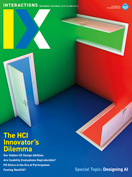Authors:
Fatemeh Moradi, Mikael Wiberg, Mikael Hansson
Smart homes, intelligent environments, interactive architecture, and human-building interaction (HBI) [1,2] all come with the promise of interactivity at the scale of architecture. However, typical interaction design works at the level of the small scale and at the level of the individual—just think about the typical use case with a person in front of a laptop, or one where a person is fiddling on his or her mobile phone. At this scale, user interfaces are typically designed for an individual to operate a computational device. But what if we want to scale interaction design from the device to the…
You must be a member of SIGCHI, a subscriber to ACM's Digital Library, or an interactions subscriber to read the full text of this article.
GET ACCESS
Join ACM SIGCHIIn addition to all of the professional benefits of being a SIGCHI member, members get full access to interactions online content and receive the print version of the magazine bimonthly.
Subscribe to the ACM Digital Library
Get access to all interactions content online and the entire archive of ACM publications dating back to 1954. (Please check with your institution to see if it already has a subscription.)
Subscribe to interactions
Get full access to interactions online content and receive the print version of the magazine bimonthly.






